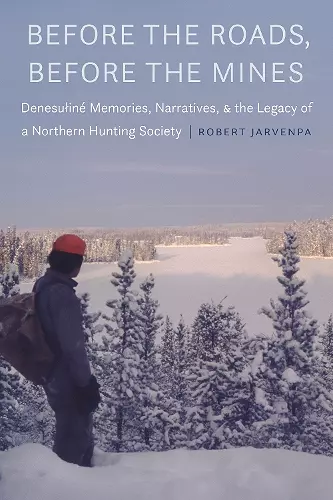Before the Roads, Before the Mines
Denesuliné Memories, Narratives, and the Legacy of a Northern Hunting Society
Format:Hardback
Publisher:University of Nebraska Press
Published:16th Dec '24
£52.00
Supplier delay - available to order, but may take longer than usual.

Before the Roads, Before the Mines is a narrative-based ethnohistory of a Denesułiné community, also known as the Chipewyan, Kesyehot’ine, or Poplar House People. The discovery of high-grade uranium deposits in northern Saskatchewan, Canada, in the mid- to late 1970s ushered in an era of mining and roadbuilding that largely replaced the traditional livelihoods of these subarctic hunter-fishers with wage labor in mining, construction, and related industries. The advent of new communications technologies and consumer goods, and a road to the outside world, created ruptures in the social fabric of the community.
Robert Jarvenpa highlights the historical experiences of middle-aged and older individuals who vividly recall a time before the roads and mines existed—when young and old alike spoke the Denesułiné language and when entire families lived in a seasonally nomadic fashion in the bush. They continually invoke the past in the problematic present, a ritualized form of communication integral to resisting or adapting to the erosive changes of a rapidly industrializing resource-extraction frontier.
Jarvenpa showcases the spoken words of the Denesułiné informants as a means of documenting and interpreting their historical past in the face of contemporary peril as the subarctic permafrost recedes and multinational corporations eye Indigenous lands for their minerals.
"This book will appeal strongly to those familiar with northern or Indigenous histories, experienced in ethnohistorical studies, or immersed in oral history."—Heather Green, H-Environment
“A compellingly and lovingly crafted book, Before the Roads, Before the Mines is a richly descriptive account of past lives and lessons of Denesułiné people, nested within contemporary social and environmental challenges facing Indigenous rural subarctic communities today. Distinguished anthropologist Robert Jarvenpa skillfully guides the reader on a journey into the past, that matters deeply in the present. . . . Honored in this work, elder knowledges are generationally ‘transcendent’ communications that enthralled and prepared Denesułiné youth and remain foundational for Indigenous response and adaptation to encroaching threats to sovereign land stewardship and social and health consequences of extractive development cycles.”—Liam Frink, professor of anthropology at the University of Nevada, Las Vegas, and author of A Tale of Three Villages: Indigenous-Colonial Interactions in Southwest Alaska, 1740–1950
“Jarvenpa uses the personal accounts of Denesułiné individuals with whom he worked from 1971 to 1992 to illustrate how ‘the presence of the past in the present’ helps groups negotiate the dramatic changes in their physical, social, and spiritual worlds, brought on by the discovery and development of uranium mines. The Denesułiné poignantly recount the trials and tribulations of their traditional lifeways, of the fur trade and its impact on their relationships with the neighboring Cree, of the devastating impacts of forest fires, and of the challenges with retaining their culture, language, and traditions in these turbulent times.”—Gerald A. Oetelaar, professor emeritus of anthropology and archaeology at the University of Calgary
“A rich, localized study such as this is of great value in enriching our understanding of the twentieth-century history of peoples in the subarctic. Many of the issues raised in this book—treaty rights, changes in the land, fires and disaster, trapping, residential schools, memory, and cultural change among the Denesułiné and other Indigenous peoples—are of enormous present-day relevance.”—Liza Piper, professor of history at the University of Alberta and author of When Disease Came to This Country: Epidemics and Colonialism in Northern North America
ISBN: 9781496239747
Dimensions: unknown
Weight: unknown
294 pages